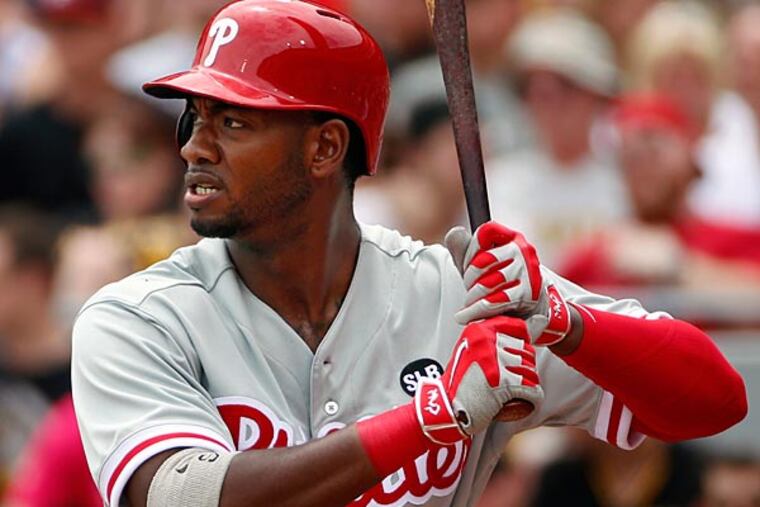Back from the minors, Domonic Brown must take chance to prove himself
Browns success in coming games will determine whether Phillies stick with him past 2015.

PITTSBURGH - Domonic Brown arrived just after 10 o'clock on a sticky gray morning. He spent some time acclimating himself to his surroundings, unpacking the bags that he'd brought with him on the trip west, exchanging pleasantries with teammates that he had not seen since March. He is 27 years old now, three-and-a-half months away from the end of his final option year, two years removed from the blistering May and June that seemed to justify the scouting reports that had hailed him as one of the best prospects in baseball. He knows that after an awful season and a two-and-a-half month stint in the minors, many people doubt that what they saw back in 2013 was anything more than a fluke.
"They want to see it again," Brown said, "and I want to see it again."
Conventional wisdom holds that these next few months are Brown's last legitimate chance to give the Phillies a reason to believe he will someday be something greater than what he already is. The reality is that his future is just as muddled as that of his organization. In some regards, they are intertwined.
Take, for instance, the looming free agency of Padres outfielder Justin Upton. At 27 years old, he offers teams an increasingly rare opportunity to add a franchise player who still has at least four years left in his prime. Recent markets have valued a player of his ilk in the neighborhood of seven years and $140 million. Even if the Phillies do not think they can contend until 2018 or 2019, they can at least sell their fans the chance to watch a lineup that includes Upton, Maikel Franco and J.P. Crawford. Unlike the NBA, there is little reason not to try to put a competitive team on the field while rebuilding. Besides, Upton is just nine days older than Brown.
Again, though, a lot depends on ownership's vision for the immediate future, beginning with the team's confidence in whatever plan the current regime lines out. Barring a green light to engage Upton, or a trade of Cole Hamels that lands a major league-ready outfield prospect, the only reason to replace Brown will be change for the sake of change.
After finishing 2013 with a .272/.324/.494 batting line and 27 home runs, he spent most of 2014 as one of the least productive hitters in the majors, hitting just .235/.285/.349 with 10 home runs. A sore Achilles' sidelined him for much of spring training, and by the end of a 20-day rehab assignment he still had not found a groove. After struggling for a month, Brown began to find his power. In the 28 games leading up to his promotion on Saturday, he hit .288/.333/.423 with two home runs and nine doubles in 111 at bats.
"At first I felt like I didn't have my legs under me yet," Brown said. "I can only imagine what Ryan Howard felt coming back. I felt 100 percent, but there wasn't any torque yet, and once I started getting 100 at- bats, I felt like, OK, I'm not slapping the ball. Now I'm starting to drive it."
Brown had Lehigh Valley manager Dave Brundage in his ear throughout his stint in the minors.
"He was saying, 'Now those singles are going to start turning into doubles,' and then they would call me into the office and say, 'Those doubles are going to start going into the seats,' " Brown said. "I'd say, 'I don't know Brundy, I feel like I've got no pop.' Then all of a sudden I started really swinging the bat well."
The existence of that pop is why the Phillies need to continue to give Brown at-bats. At some point, though, they need to see it manifest itself on a regular basis.
Unlike Franco, Brown does not have - or, at least, has not displayed - the defensive acumen to warrant a place on the field in spite of his bat. Yet consider the players who started alongside him yesterday. Jeff Francoeur's .728 OPS on the season was just seven points higher than Brown's career mark. Ben Revere's .671 OPS in 2015 was similar to the .634 he has carried throughout this year. On the bench were Odubel Herrera, a converted second baseman whose .250/.280/.363 line overshadows his surprising defensive adequacy, and Cody Asche, whose .594 OPS on the season and .674 mark in 780 career plate appearances might render moot whether he can play the outfield.
In the minors, Aaron Altherr's improved strikeout rate and .798 OPS could warrant a look at what the 24-year-old can do with a regular dose of big-league pitching. And 22-year-old Roman Quinn isn't any less advanced than Herrera was this year when the Phillies threw him into the fire. Quinn is hitting .306/.356/.435 with 29 steals at Double A Reading. But that is the extent of the obvious options.
No doubt, there is some Dom Brown fatigue in a fan base that has been hearing about his potential since the end of the 2008 season. Even Ryne Sandberg was muted in his expectations on Saturday night.
"He'll get some chances to start, and I'll try to mix and match and try to rotate the guys as I see fit," the manager said.
Yet Brown was one of only two players in yesterday's lineup who offer any bit of intrigue about the future. Revere, Francoeur, Freddy Galvis, Chase Utley, Howard, Carlos Ruiz - what you see today is just about all you are going to get from them in the future. With Brown, there is at least some element of the unknown.
Blog: ph.ly/HighCheese